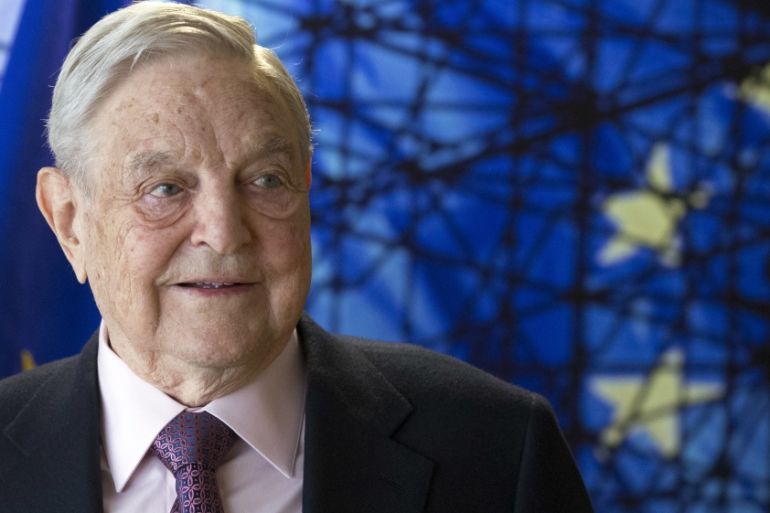George Soros: Many Hungarians believe he has a party
No such political party exists but government campaign against the ‘Soros Agenda’ has ramped up before the elections.

Roughly two-thirds of Hungarian voters believe a George Soros political party will run in the country’s April election, according to a poll released on Monday.
Policy Agenda, a private Hungarian polling firm commissioned by local media to survey voter expectations, listed a number of parties running for election, including the “George Soros Party” – which does not exist.
Keep reading
list of 4 itemsGreece braces for trial over ‘one of the worst’ Mediterranean shipwrecks
Iranian man loses bid to be freed from Australian immigration detention
Beyond borders: Migrants online
Some 64 percent of respondents said they did not believe the party of the 87-year-old Hungarian American billionaire, known for his support of liberal causes, would win.
Only 24 percent of those polled were aware the party was made up by the polling firm.
‘Soros Plan’
Soros has been characterised – both by far-right activists and members of the Hungarian government’s ruling party Fidesz – as wanting to dilute the Christian nature of Europe by opening its borders to refugees from predominately Muslim nations.
“George Soros’ network is working to ensure that as many people as possible reach Europe, because they believe this is what will ensure the future of the continent,” Hungarian government spokesman Zoltan Kovacs told a local radio station in January.
“This is a political programme in which organisations that help migrants are taking part ‘disguised’ as human rights organisations,'” Kovacs said.
A nationwide survey on the “Soros Plan” was completed at the end of 2017. Kovacs said in January more than two million questionnaires were returned.
The Soros Plan was “unanimously” rejected by Hungarians, he said.
The Hungarian government introduced legislation on January 17 that aims to penalise foreign-funded NGOs that support refugees and immigrants.
Kovacs called it the “Stop Soros” bill. It would make such NGOs pay a 25 percent tax on foreign donations.
The bill was derided by rights groups and critics of the government. It was the latest in a long line of heavily criticised measures from the Fidesz government.
In June, NGOs were required to register with the government and disclose if they receive foreign funding.
Amnesty International promised to challenge “Hungary’s repressive new NGO law in the courts.”
The rights group had no intention of complying with the law “until all these avenues have been exhausted”, Julia Ivan, director of Amnesty International Hungary, said at the time.
Increase in parties
When Hungary goes to the polls on April 8, a wide range of parties will have a chance to win votes. According to a database kept by Hungary’s National Office of the Judiciary, there are 250 political parties in the country of 10 million.
About 120 of these parties were founded since the last national election in 2014, with 70 registered in 2017 alone.
Hungary’s opposition has lost elections since the mainstream Socialist Party was rocked by corruption scandals that led to its defeat in 2010.
Fidesz won that year with a two-thirds majority and made Viktor Orban prime minister.
Orban, who studied at Oxford thanks to scholarship funding from Soros, has adopted an anti-refugee, anti-migrant stance that has remained popular as voters in central and Eastern Europe have turned to the far-right.
Fidesz won nearly 45 percent of the vote in the 2014 elections, enough to form a majority government.
Polls show the ruling party with the support of 51 percent of Hungarian voters as of January 16.
Still, roughly two percent of Hungarians said the Soros Party could win the election, according to the Policy Agenda poll.